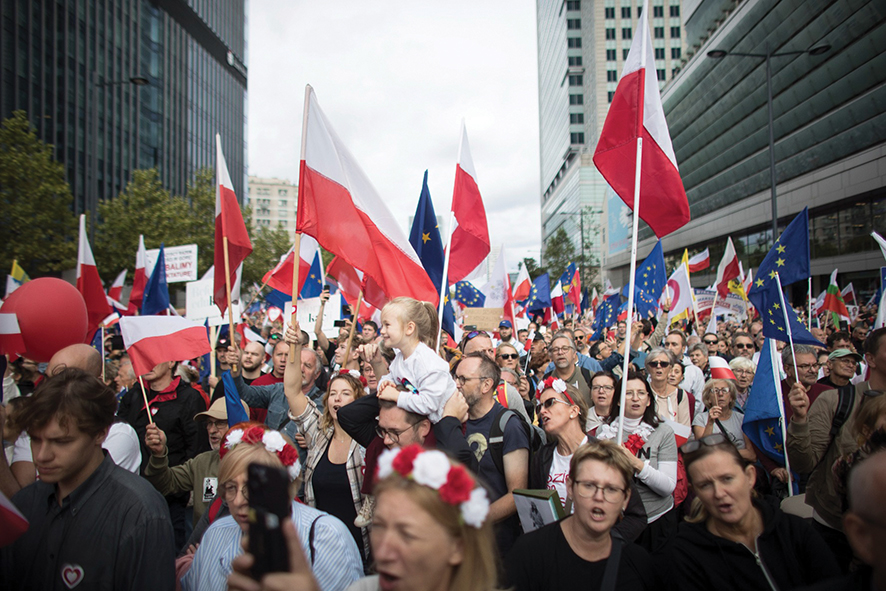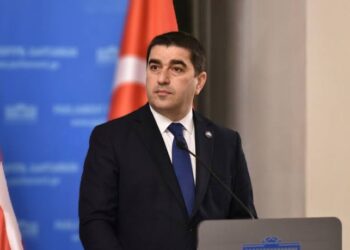Both the government and the opposition perceive Russia as a threat, so despite the change of government, the approach to Russia will not change, – Adam Reichardt, editor-in-chief of New Eastern Europe told RFE/RL, speaking of the results of the elections held in Poland on October 15. As one of the results of those elections, he also sees that “Orbán [the Hungarian Prime Minister] will have to come to terms with the fact that there will be a new government in Poland, which, if Brussels decides to punish Budapest, will not stand in the way, not anymore.”
The Polish elections – how big a change is that? Some are calling it “a revolution”, your own outlet called it a “Wind of change.” What does it spell for Poland?
This is a huge question. I think the change we’re going to see is actually not going to be huge right away. It is a very important change and, in the long term, I think it will have a huge impact. But if anyone is expecting a massive new Poland to emerge within the next two weeks, that’s not going to happen. There are a lot of things that that need to happen before any major changes take place.
We have to remember that President Andrzej Duda, who is related to the Law and Justice Party, is still president. He has a very big and important say in what happens in the formation of the government and how laws are passed or not passed. He will still be playing this important role. That said, I think it is important to recognize that there was a definite sign that the Poles wanted change, and they wanted things to change; the majority of Poles had had enough of the last eight years and were ready for something new, but we have to recognize that while the Law and Justice Party, which has been in power for eight years, did win the election, technically, because they had the most votes, they’re not able to form a government due to the fact that they don’t have enough seats. They could have had a coalition partner, but declared that they wouldn’t form a government with them. So they won the election, but they won’t have a government.
Who do you think are winners and losers of this election, both in Poland and externally?
Let’s start with the winners. First and foremost, we should say the winners are the Polish people, because a turnout of 75% is almost unheard of in a democratic country where you do not have obligatory voting. Poland has never seen such a turnout, not even at probably the most important elections in Polish contemporary history, in 1989, which led to the system changeover. So I think the Polish people are probably the biggest winners because they were wanting their voices to be heard. They weren’t being heard, and so they called for change. Of course, as they name themselves, the pro-democratic forces are the winners, because they have managed to get these votes and create this pro-democratic block which will take power. So they are, obviously, another of the winners. And we can look now, who else outside of Poland is a winner. Let’s say the European Union. Poland will be putting itself back on the stage, try to position itself as more liberal, but still a leading power in Europe.
Looking at what is happening in other countries in Europe, Poland will try to present itself as an example. It can drive change, as an example of how populism can be defeated. And it can perhaps try to take a leadership role which will be more recognized in Brussels, in other capitals, like Berlin and Paris.
As for the poor losers, besides, of course, the Law and Justice Party, which is obvious, I think even more important, and more stunning, in some ways, is the far right in Poland, as the biggest loser. In the summer, just a few months ago, they were polling at double digits, and they managed to come out with just 7% of the vote. They were expecting a much higher result.

Externally, countries like Hungary, and Orbán, can be considered losers in this situation. He has lost an ally in Warsaw, which wasn’t really, to be honest, the strongest ally he had to begin with, especially since Russia’s invasion and seeing Viktor Orbán going to Beijing and meeting with Putin. Hungary is getting pulled farther and farther away from Europe, unfortunately. Orbán is good at making his own alliances and not caring about what’s happening as a member of the EU and NATO. He should know now that there is a new government coming in Poland, and if Brussels decides to punish Budapest, Warsaw will not stand in the way, not anymore.
The 74% turnout was quite staggering, with a rather sizeable proportion of women and younger voters participating. Could that be a template for Georgia to follow as an example? Any lessons?
There are a couple lessons to be learned here, especially for the Georgian opposition. First is that you have to rebrand yourself. Knowing a bit about Georgian politics, I would say that you’re stuck in a bipolar situation where you have just two sides, and neither very attractive to the electorate in general. And we were going in that direction in Poland as well, but the Civic Platform rebranded itself, and so did Donald Tusk, on a personal level. And they were very focused on the youth, rather than on just their core electorate. One other thing is the emergence of the so called third forces – in Poland, we have this Third Way party, which did better than expected, gaining almost 15% of the vote. And they were presenting themselves as the third way, meaning, not as part of this bipolar system; something that’s focused on being above polarization, above the dirty politics. And that was very attractive to a lot of voters across all age groups. In Georgia, they say there will never be a third force, because it just cannot emerge in the present extremely polarized conditions, but I think, looking at Poland, it can be done.
One of the trump cards the Polish ruling party doesn’t possess, unlike their counterparts in Tbilisi, is that they don’t get to terrify the population with the prospect of war with Russia if another government comes in.
Well, in fact, actually, we have the somewhat reverse situation: The Law and Justice party (PiS) had a narrative claiming that Donald Tusk is quietly pro-Russian, and that if he comes to power, he will, with Berlin, reconcile with Moscow, and then accept the Russian influence. But in the end, there is a general consensus throughout the Polish political class that Russia is a threat to Poland. We need to support Ukraine, and this is not going to change, no matter which side wins.
And the implications for the Ukraine war, especially considering the strained relationship between Warsaw and Kyiv ahead of the elections. What changes should we expect now?
These strained relations, which revealed themselves at the end of August, and in September ahead of the elections, was largely for the internal audience, politically. I think Law and Justice started realizing they were losing support, and they wanted to go after the electorate of the far right, the Confederation party. And that party is clearly anti-Ukrainian. Very anti-migrant; it doesn’t want to support Ukraine it, wants to send the refugees back. And I think PiS was trying to go after them and it probably wasn’t a very effective strategy. Polish people generally are very pro-Ukrainian, and want to support Ukraine in defense of its territory.
There is a general consensus throughout the Polish political class that Russia is a threat to Poland
Once the new government comes to power, I expect to see some corrections to repair these, I would say minor, issues. The biggest issue is the green corridor that was shut down, even after the EU said that it could be opened again. I think they will find a way to open a transit corridor for Ukrainian grain and other agricultural products, with a guarantee that they won’t find their way onto Polish markets, which would compete with the local agricultural sector here, because that’s the biggest concern among the farmers in Poland. I think they will find a way to do it. It’s an issue that was largely instrumentalized for the election.
The ATACMS debuted on the battlefield and won Ukraine the greatest single day losses to the Russian Air Force in its history. Does this mean we can expect more ATACMS deliveries from the US?
I think we will see more, because the success was so spectacular. And once the F-16s are in the air and the Abrams are on the ground, we will see more successes. We know that the counteroffensive has been very slow. It’s been very good at draining Russian resources, but hasn’t been very good at reclaiming territory, because of things like the helicopters which the Russians were using to slow the offensive for the tanks. When Ukraine shows how effective even the first use of the F-16s and Abrams is, how effective they are, it should convince Washington that this is a no brainer. My opinion, it should have been done a long time ago. And I don’t expect any sort of Russian reaction outside Ukraine. That’s the fear in Washington: escalation, not between Russia and Ukraine, but between Russia and the West. But Russia is not going to respond outside of Ukraine.
Elections that Ukrainians will be very intently looking forward to are those in the US. What’s at stake for Ukraine there?
Everything is at stake for Ukraine, unfortunately, in these elections. And we already saw the cracks in the US when they didn’t have a house speaker. They were in this chaotic situation where nothing could get passed because they didn’t have the infrastructure to make legislation, which is required in order to pass major new support for Ukraine, and not only Ukraine, which is expecting support from the US, but also to respond to Hamas.
The politics in the US right now is really so polarized, so toxic, that we might end up looking at a house speaker who, the first thing he does, is stop any aid packages going to Ukraine. It shows how much is at stake. And this is just at the congressional Republican level. Now imagine the election a year from now, Donald Trump is reelected or brought back to the White House. This would be really bad for Ukraine, everybody can admit that. I think it’s a pretty objective statement.
Once the new government comes to power, they will find a way to open a transit corridor for Ukrainian grain and other agricultural products
I’m very curious to see how the campaign will go through 2024. If Ukraine can have these kind of successes, like we just saw with the ATACMS, Biden can showcase this, as “look, how much we helped Ukraine to dismantle Russia’s military might.” But if things stay slow, and there are no more visible successes to demonstrate that American aid is directly assisting Ukraine on the battlefield, it could be more difficult for Biden. So there’s a lot at stake for Ukraine in American politics. I think Ukraine is smart to try to keep the international coalition together. But we all know and we all understand that without the US, Ukraine cannot do as well as it possibly could.
Interview by Vazha Tavberidze














